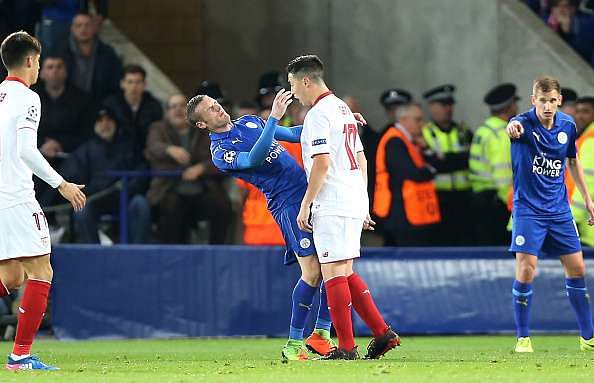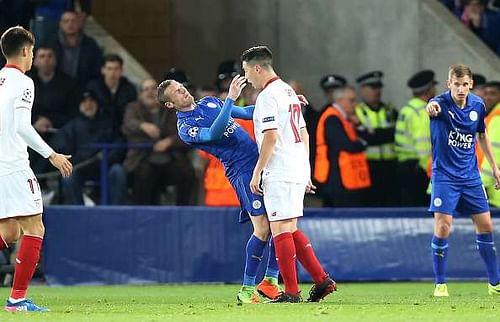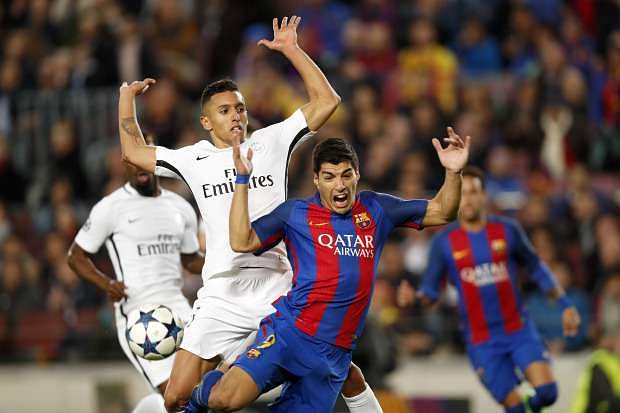
Jamie Vardy's theatrical fall - Where's the moral police now?
“I thought the English player was tougher than that. He was the one who came to my face, and then went on the floor. He played it well. For me, he is a cheat. Because if he was a foreign player, you, the English press, would say he is a cheat. For me, he is a cheat”.
Samir Nasri is not the most temperamentally sound footballer out there. Agreed. Yet, it would only be fair to say that beneath the tomfoolery, naivety and occasional tantrums that are borderline unprofessional, is a footballer who doesn’t mince his words and calls a spade a spade.
And while outbursts such as the ones following his international retirement were downright delusional, the latest one – regarding his headbutt on Jamie Vardy and the subsequent dismissal – was refreshingly honest albeit characteristically outspoken.
Did the Sevilla midfielder headbutt Jamie Vardy? Technically, yes. However, the viciousness and violent imagery the word brings forth in one’s mind (read Zinedine Zidane bulldozing Marco Materazzi) greatly exaggerates what was at most, a silly incident on the pitch.
Not that Vardy considered it so. The Leicester City striker collapsed on the ground as if he’d been sniped by Bradley Cooper before Clint Eastwood said “Action!”. A good ol’ dollop of playacting served up right there.
It is at this juncture that I find it pertinent to go back to the first part of Nasri’s aforementioned quote. “The English player,” he says like they’re a separate species walking a different field, playing a different game. One can’t help but smell the sarcasm in the statement aimed at those pundits of the game from the Old Blighty who self-righteously sing praises of the “English way” and scoff at the “Continental dark arts”.
Aah! The English way. The phrase that makes them believe the (non-existent) superiority of English football in every imaginable way – right from doubts on whether Lionel Messi can be Lionel Messi on a cold, rainy night in Stoke to Zlatan Ibrahimovic being just an overrated Andy Carroll, at least till this season.
This superiority, they say, extends to the ethical side of the game as well. English footballers are supposedly more honest, hardworking and less susceptible to underhand means such as simulation and cheating.
This condescension which sees every English footballer not named Joey Barton placed on a moral pedestal higher than the rest of the world needs to be questioned. Ashley Young, Raheem Sterling, Ross Barkley and countless other English footballers have been repeatedly accused of diving in the recent past.
Yet, criticism and vitriol from the proverbial moral high horse are conspicuous by their absence when it comes to English players indulging in the act of simulation.
Neymar is a ballerina, but Ashley Young isn’t? Yeah, right.
The selective sermonising of the English media
If diving looks repulsive on camera, playacting – especially the type where the culprit falls and writhes like a victim of the Scarface machine gun – looks positively atrocious for all viewers concerned.
Remember Sergio Busquets against Inter Milan? David Luiz against Manchester United? Luis Suarez, most recently, against Paris Saint-Germain? In fact, it is the selective sermonising practised by the English press regarding the Suarez incident as opposed to the Vardy one that drove me to write this article.
“Luis Suarez and Barcelona’s dark arts break PSG hearts in UCL miracle” was the headline of a prominent publisher the day after that historic night at Camp Nou. Bring on the Voldemort masks and Death Eater hoods, for Barcelona and their talismanic forward whom the English love to loathe, had won by evil and despicable means.
“Jamie Vardy and Leicester City’s dark arts break Sevilla hearts in UCL miracle” on the other hand? Nah, he’s English, let’s make Nasri the villain.
Put simply, such convenient and selective myopia reeks of snobbery. Needless to say, the “dark arts” were cited by multiple platforms as the primary – if not only – reason behind Barcelona snatching victory from the jaws of defeat.
Another author alludes to the still sanctimonious innocence of the English “blood and thunder” footballer saying, “British players, it is even stated, should become more streetwise when catching up with the ‘art’ of simulation”. The implied meaning of British players not being streetwise already is to put it succinctly, bollocks.
Also read: We don't forget Ranieri – Mahrez hits out at Leicester critics
Few footballers are as shrewd and ‘tough as nails’ as Jamie Vardy, and that is a compliment. However, a blatant act of misleading the referee needs to be scorned at, just as it was in the case of Luis Suarez and co. If not, the deafening silence regarding the Vardy-Nasri episode would be too annoying an itch to ignore.
It is unbecoming of the men who smirk at corner flag time wasting and injury time calf cramps to not respond harshly to their countryman’s theatrics. Jamie Vardy, it should be said, wouldn’t look out of place in the silver screen based on such evidence, what with his biopic coming up.
Leicester City’s comeback against Sevilla was football at its finest; the latest chapter in their scarcely believable underdog story. The lone bearers of the English flag in the last eight of the UEFA Champions League, they ought to be proud of themselves. Just as Barcelona can take pride in what was surely the greatest last-minute comeback modern football has seen.
While the actions of Jamie Vardy and Luis Suarez cannot and should not be condoned, neither should taint the achievements of two teams with such incredible mental fortitude.
However, the same rules apply across the board and if one game was marred in the eyes of some by gamesmanship, so should the other be. Jamie Vardy outfoxed the referee (excuse the pun) as did Luis Suarez, and they both deserve the same level of admonishment.
Failure to do so would not only be unfair but would count as some kind of vendetta against any non-English footballer resorting to such antics. It is time for a Brexit from such antiquated prejudice.
PS: Dear Nasri, who does that on a yellow card? Why? Just why?

